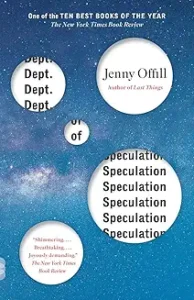Dept. of Speculation by Jenny Offill 2014
Offill’s short novel was one of those which I discovered in “Great Short Books”. I had neither heard of the title nor of the author, so this was a great find.
It’s the kind of book that had I picked it up at random, I would have probably stopped reading after a few pages. The style was initially off-putting—short paragraphs of just a few lines separated by double spaces with few if any details about characters, plot, setting, etc. This is one of those books that is truly a partnership between the author and the reader as the latter is left to deduce most of the information that is usually provided by the author.
Offill’s first book, “Last Things” was a NYT Notable Book but it was ten years before this one appeared. It’s the story of a professor who struggles with writing her book, with her colicky baby who only quiets when walked through the aisles of the local Rite Aid, and with her marriage which threatens to be destroyed by her husband’s infidelity. Intending to come to NYC to become an ‘art monster’ ala Nabokov “who didn’t even fold his own umbrella or lick his postage stamps”, she is derailed by the intrusion of life—an apartment, a baby, an unfinished book, an unfaithful husband. The story is told in a series of almost aphoristic, brief paragraphs, e.g. “The Buddhists say there are 121 states of consciousness. Of these, only three involve misery or suffering. Most of us spend our time moving back and forth between these three.” I loved that, and it’s quite characteristic of the whole book, one which you can read in a couple of sittings.
Along the way, Offill introduces us to Rilke (“Surely all art is the result of one’s having been in danger, of having gone through an experience all the way to the end, to where no one can go any further.”), Voyager 2’s golden recording’s authors, Zen master Ikkyu who when asked by an acolyte to write a distillation of the highest wisdom, wrote “Attention” and when asked to expand upon that, wrote, “Attention. Attention” and Emma Bovary’s experience with reading novels.
As Davis writes and as you will see if you read the next two reviews, Offill’s book as well as Ferrante’s and Lessing’s “explore the power, weight, and costs of motherhood…probing the burden of this life as well as the writer’s struggle to create.” I didn’t intend to read these three books about this theme, but chose the Ferrante because her “My Brilliant Friend” series had been chosen as the #1 book of the 21st C by the New York Times and I had not read her. I chose the Lessing book because I found it on the shelves of a friend’s library while in Chicago last week. The three make a powerful case for the complexity facing today’s woman, and they’re all beautifully written.
Read Offill’s book. It’s full of gems which I intend to rediscover on a second reading. I think you’ll find it worth your time.



